| Srl | Item |
| 1 |
ID:
138379
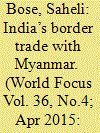

|
|
|
|
|
| Summary/Abstract |
Even though India has been taking initiatives to reach Myanmar but still efforts are called for. India not only needs to negotiate with Myanmar on serious issues like insurgency, drug trafficking and increasing formal trade but also need to manage its own internal issue like development and security of the Northeast region, arranging for speedy trade negotiations and building proper business environment to capitalize each other’s potentials.
|
|
|
|
|
|
|
|
|
|
|
|
|
|
|
|
| 2 |
ID:
140304
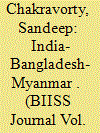

|
|
|
|
|
| Summary/Abstract |
Many sub-regional initiatives are prospering in Asia. As the limits to regional cooperation become evident, particularly in the SAARC context, sub-regional cooperation offers a window of opportunity for India to push through economic integration of India with its South and South East Asian neighbours. Already some examples exist which need to be emulated and expanded upon such as ADB‘s SASEC programme for some South Asian countries or BIMSTEC involving South and South East Asia. This paper spells out the need and rationale for energising sub-regional cooperation among three major countries straddling the South and South East Asia axis namely India, Bangladesh and Myanmar. It argues that there is sufficient content and context in the three bilateral relationships, which of late have been witnessing upswings, to start working on various trilateral cooperation proposals. This will not only be a win-win formula for all three countries involved but will also propel greater cooperation in some other larger configurations of sub-regional cooperation namely BIMSTEC or BCIM-EC as these three countries form the geographical kernel of other frameworks as well.
|
|
|
|
|
|
|
|
|
|
|
|
|
|
|
|
| 3 |
ID:
112766
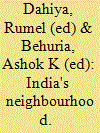

|
|
|
|
|
| Publication |
New Delhi, Institute for Defence Studies and Analyses, 2012.
|
| Description |
xxx, 226pHbk
|
| Standard Number |
9788182746879
|
|
|
|
|
|
|
|
|
|
|
|
Copies: C:2/I:0,R:0,Q:0
Circulation
| Accession# | Call# | Current Location | Status | Policy | Location |
| 056593 | 327.54/DAH 056593 | Main | On Shelf | General | |
| 056594 | 327.54/DAH 056594 | Main | On Shelf | General | |
|
|
|
|
| 4 |
ID:
124079
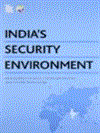

|
|
|
|
|
| Publication |
New Delhi, Konark publishers Pvt.Ltd., 2013.
|
| Description |
xxvi, 362p.Hbk
|
| Standard Number |
9789322008260
|
|
|
|
|
|
|
|
|
|
|
|
Copies: C:1/I:0,R:0,Q:0
Circulation
| Accession# | Call# | Current Location | Status | Policy | Location |
| 057472 | 355.033054/ROY 057472 | Main | On Shelf | General | |
|
|
|
|
| 5 |
ID:
134034
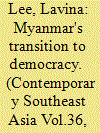

|
|
|
|
|
| Publication |
2014.
|
| Summary/Abstract |
In the mid-1990s, India faced considerable criticism for abandoning its strong support for pro-democracy forces in Myanmar. Instead, New Delhi chose to pragmatically engage the ruling military junta in order to pursue a number of key security, energy, economic and geostrategic interests that could not be achieved without its cooperation. The results of this change of approach have been modest, and as Myanmar transitions to democracy New Delhi hopes that new opportunities to progress these interests will emerge, rather than new obstacles. This article assesses whether a prospective National League for Democracy (NLD) led government will have the capacity to eradicate Indian insurgent groups (IIGs) operating in Myanmar's territory, be responsive to initiatives to expand trade between the two countries - particularly with India's northeastern states - and be more open to Indian investment. It argues that while the NLD is committed to greater economic liberalization and a closer economic relationship with India, Myanmar will not be an attractive market for Indian firms for some time (outside of the resource sector) until liberal institutions and open competitive practices are more firmly established. This article also argues that the NLD lacks a credible plan to bring an end to the country's long running ethnic insurgencies, and will not have the capacity to comprehensively crack down on IIGs.
|
|
|
|
|
|
|
|
|
|
|
|
|
|
|
|